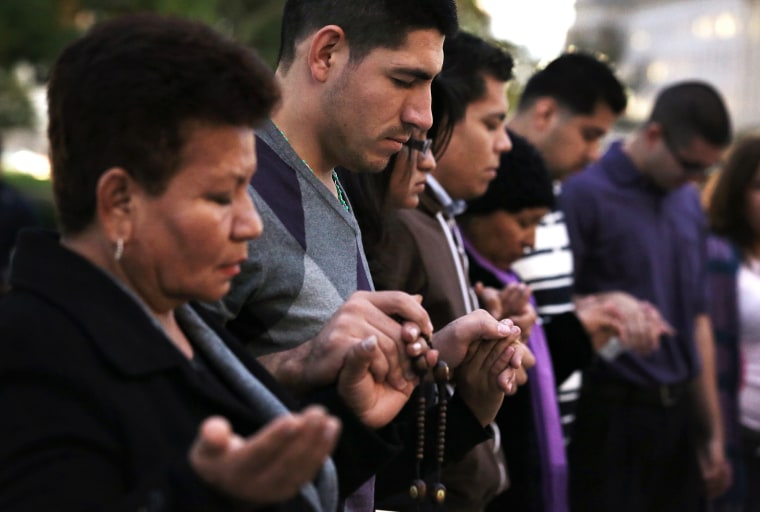President Obama had two messages on Thursday morning. One: Immigration reform is not dead. Two: If immigration reform does die, you'll know who to blame.
"It's up to Republicans in the House to decide whether reform becomes a reality or not," he said in a speech from the White House.
Obama touted support from numerous prominent Republicans and from typically conservative interests like business groups and evangelical organizations for a reform bill. Left unsaid, but implied: its opponents are mostly the same Tea Pary groups and right-wing commentators who egged on the disastrous shutdown.
"I know that there's some folks in this town who are primed to think, well, if Obama's for it, then I'm against it," he said. "But you know, I'd remind everybody that my Republican predecessor was also for it when he proposed reforms like this almost a decade ago. And I joined with 23 Senate Republicans back then to support that reform."
Key Republicans have publicly expressed interest in pursuing immigration, including Speaker John Boehner, who said on Wednesday he was "hopeful" the House could find a solution. But so far the only bills they've produced are about border security, interior enforcement, and expanding work visas.
The elephant in the room for the House GOP is still what to do with the estimated 11.7 million undocumented immigrants already in America. House leaders have already rejected a bipartisan Senate bill passed in June that would provide a path to earned legal status and citizenship for qualifying immigrants. Obama challenged the House on Thursday to at least respond with something similar.
"It doesn't make sense to have 11 million people who are in this country illegally without any incentive or any way for them to come out of the shadows, get right with the law, meet their responsibilities and permit their families then to move ahead," Obama said. "It's not smart; it's not fair; it doesn't make sense. We have kicked this particular can down the road for too long."
House leaders have tried to tiptoe around the legalization question until they're confident they can overcome the inevitable Tea Party backlash, but there are signs they're starting to grapple with it. Congressman Darrell Issa is working on a proposal that would grant temporary legal status for six years to some undocumented immigrants. While it would be the first Republican bill of its kind this year, Issa's proposal is unlikely to pass muster with immigration groups looking for a permanent fix. A more sweeping proposal could come from Congressman Mario Diaz-Balart, a longtime reform advocate now working with other Republicans on a legalization bill. Majority Leader Eric Cantor has also been working on a separate bill to address young undocumented immigrants, commonly referred to as DREAMers, but has yet to release any details on the proposal.
Boehner has to make some tough political decisions about how far he's willing to go to pass a bill. Even some members relatively supportive of immigration reform sound reluctant to hand the White House a victory. But Obama's speech was a reminder of the consequences if the House fails. It was the GOP's disastrous performance with Latinos in 2012 that revived the immigration debate in the first place. And while Obama may not be up for re-election again, whoever tries to replace him on the Republican side will have to beat a Democratic nominee running the same playbook on immigration.
